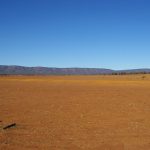 July 28, 2021 2:43 pm
Published by Climate Extremes
July 28, 2021 2:43 pm
Published by Climate Extremes
Irrespective of tipping points, climate change adaptation efforts will be less costly and disruptive to society – and will stand a better chance of success – if warming can be limited to 1.5°C rather than 2°C or higher. We therefore in no way advocate for policies that forgo pursuing the ambition to limit global warming to 1.5°C, regardless of whether that target remains feasible or not.
 April 30, 2021 12:16 pm
Published by Climate Extremes
April 30, 2021 12:16 pm
Published by Climate Extremes
Different expressions of El Niño do affect interannual variability in the terrestrial carbon cycle. However, the effect over longer timescales is small. This means the changing frequency of these two types of El Niño events may be of little importance in terms of robustly simulating the future terrestrial carbon cycle.
 February 12, 2021 2:05 pm
Published by Climate Extremes
February 12, 2021 2:05 pm
Published by Climate Extremes
In this study, the researchers propose a reporting format for leaf-level gas exchange data and metadata to provide guidance to data contributors on how to store data in repositories to maximise their discoverability, facilitate their efficient reuse, and add value to individual datasets.
 November 24, 2020 12:27 pm
Published by Climate Extremes
November 24, 2020 12:27 pm
Published by Climate Extremes
In this paper, the researchers investigated how dryness, represented by the aridity index, affects the inter-annual variability of ecosystem iso/anisohydricity at the regional scale, estimated using satellite microwave vegetation optical depth observations.
 October 20, 2020 1:41 pm
Published by Climate Extremes
October 20, 2020 1:41 pm
Published by Climate Extremes
An international group of researchers performed a critical review of the information infrastructure that connects ecosystem modelling and measurement efforts. This group has now proposed a roadmap to community cyber-infrastructure development that can reduce the divisions between empirical research and modelling, accelerating the pace of discovery.
 June 18, 2020 11:09 am
Published by Climate Extremes
June 18, 2020 11:09 am
Published by Climate Extremes
CLEX researchers implemented a new model of plant hydraulics into the Community Atmosphere Biosphere Land Exchange (CABLE) land surface model to robustly project future drought impacts on Australian vegetation.
 June 2, 2020 10:50 am
Published by Climate Extremes
June 2, 2020 10:50 am
Published by Climate Extremes
An analysis of new climate model projections by Australian researchers from the ARC Centre of Excellence for Climate Extremes shows southwestern Australia and parts of southern Australia will see longer and more intense droughts due to a lack of rainfall caused by climate change.
 March 13, 2020 10:59 am
Published by Climate Extremes
March 13, 2020 10:59 am
Published by Climate Extremes
In this study, CLEX researchers and colleagues analysed the magnitude and sensitivity of vegetation responses to the Millennium Drought with satellite-derived information.
 March 10, 2020 11:08 am
Published by Climate Extremes
March 10, 2020 11:08 am
Published by Climate Extremes
In this study, CLEX researchers and colleagues tested the ability of 10 terrestrial biosphere models to reproduce observed sensitivity of ecosystem productivity to rainfall changes (rainfall exclusion/irrigation) at ten sites across the globe.
 December 7, 2019 9:00 am
Published by Climate Extremes
December 7, 2019 9:00 am
Published by Climate Extremes
The drought program explains what is unusual about the current drought in Australia and in examining flaws in the Aridity Index explores how drought may change in the future.










